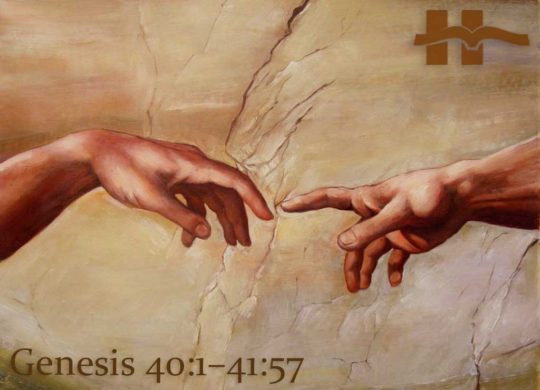Genesis 40:1–41:57

Trusting in God’s working even when it is indiscernible results in divine blessing.
Joseph is in jail, falsely accused of rape. But God is always at work, even if one cannot see him working. Though God is not mentioned in this section, the literary absence of God is not a literal absence of God.
Joseph has with him in prison, the Pharaoh’s baker and butler, in detention for unknown crimes. These two fellow prisoners have a pair of dreams (40:8–19). Joseph interprets them (40:9–19) and they are fulfilled precisely (40:20–22): the baker is executed; the butler is exonerated. Joseph had requested that the butler remember him when he is released, but the ingrate forgot his benefactor for two years until …
The Pharaoh himself has a pair of dreams in 41:1–8 that no one can interpret. The restored butler remembers his experience with his Jewish fellow-prisoner and mentions it to the Pharaoh. Joseph is summoned; he interprets the dream that warns of seven years of plenty followed by seven years of famine, and advises that preparations be made during the fatness of the former for the leanness of the latter. Pharaoh agrees and puts Joseph in charge of everything, second only to the Pharaoh. Blessed abundantly!
Earlier, when Pharaoh’s officials were worrying about their dreams and what they mean, Joseph asked his fellow-prisoners, “Are not of God interpretations?” (40:8). Later when Pharaoh worries about his dreams and tells Joseph he’s heard of the latter’s abilities, Joseph demurs, “It is not in me. God will give Pharaoh a favorable answer” (41:15–16). This, then, is a man whose faith in God and God’s working is undiminished by the passage of time and unhindered by the disagreeable turn of events in his life. Even in prison (forgotten for two years), he is confident of God’s sovereignty and providence. In fact, though the two-year lapse of memory of the butler is reprehensible, we must acknowledge that had Joseph been released any earlier than two years later, it is unlikely he would have been around to interpret Pharaoh’s dreams in Gen 41.
All that to say, God’s providence undergirds this story and life itself. God is working, surely, certainly, silently, inexorably. The way the narrative moves, the storyteller intends for the reader to catch the implicit, behind-the-scenes, sovereign, and providential working of God. God gives Pharaoh his dreams (41:25, 28, 32); the butler just happens to remember Joseph and mentions him to the ruler (41:9); God enables Joseph interpret the dreams (41:16, 25, 28); and finally, even Pharaoh credits the hand of God in Joseph’s work (41:38, 39). Later, Joseph again acknowledges God’s providence in the naming of his sons (41:51, 52). From prisoner to Prime Minister of all Egypt, under the Pharaoh—from cell to court, from prison garments to a royal garb (41:42)—the blessing of God! Indeed, no one, Pharaoh declares, would “raise hand or foot” without Joseph’s permission (41:44). Ha! Joseph had experienced his brothers lifting up their hand against him (37:21, 22, 27); he had experienced a woman lifting up her eyes against him (39:7). But no more would anybody lift up any body part against him without his permission!
Later, in response, Joseph acknowledges divine workings as he names his children (41:51–52): “Manasseh”—“God has made me forget all my trouble and all my father’s house,” and “Ephraim”—“God has made me fruitful in the land of my trouble.”
Interestingly, all the four dreams—the two of the officials and the two of Pharaoh—are linked, directly or indirectly, with food. The officials are in charge of Pharaoh’s food and drink, and their respective dreams deal with the appropriate victual they handle. Pharaoh’s dreams concern grazing, eating, swallowing, devouring (41:2, 4, 7, 18, 20, 21, 24), interpreted as dealing with food supply and famine (41:29–31). And finally, Joseph, placed in his lofty station, will be the manager of Egypt’s food supply for the conceivable future. Thus the narrative sets in place what will bring Joseph’s family to Egypt one day—food! This focus on the staples of life, the dire needs, and Joseph’s divinely ordained placement in an office that disburses supplies to those in need, emphasize the provision of God through Joseph—he is blessed and he is the agent of divine blessing to all around him.











 Abe Kuruvilla is the Carl E. Bates Professor of Christian Preaching at The Southern Baptist Theological Seminary (Louisville, KY), and a dermatologist in private practice. His passion is to explore, explain, and exemplify preaching.
Abe Kuruvilla is the Carl E. Bates Professor of Christian Preaching at The Southern Baptist Theological Seminary (Louisville, KY), and a dermatologist in private practice. His passion is to explore, explain, and exemplify preaching.